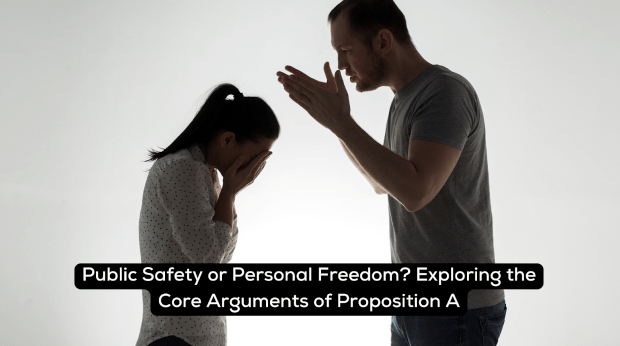
From the dawn of civilization, societies have grappled with the delicate balance between maintaining public safety and preserving personal freedoms. Proposition A, a hypothetical legislative framework, reignites this age-old debate, polarizing opinions on the balance between collective security and individual liberties.
Proponents argue that limiting certain freedoms responsibly is a necessary trade-off for fortifying public order and safety. Conversely, critics decry Proposition A as an existential threat to constitutionally enshrined rights like privacy, free speech, and due process.
This analysis delves into the multifaceted perspectives of this consequential issue, empowering citizens to engage in informed discourse and shape policies that honor societal imperatives.
The Delicate Balancing Act That Defines Our Society
Striking the appropriate balance between preserving public safety and safeguarding personal freedoms has perpetually challenged societies throughout human civilization. This intricate debate, pivotal to the foundations of any free society, is reignited with the introduction of Proposition A – proposed legislation promising enhanced security measures.
However, a stark dividing line emerges over potential compromises to constitutional liberties that such policies may entail. As society grapples with the nuances and complexities of this issue, Understanding the core arguments from both sides is crucial to engaging in an informed and productive civic dialogue.
There are two main viewpoints on this issue:
- Some people prioritize public safety and order in society above all else. They believe having a stable and secure society is crucial, even if it means placing some limits on personal freedoms.
- Others believe strongly in protecting personal freedoms and civil liberties. They are very wary of any measures that could infringe on individual rights, even if those measures are intended to improve public safety.
These two priorities – maintaining a safe, orderly society and protecting personal freedoms – are both important, but can conflict with each other. We need to carefully consider both perspectives and find the right balance between them. Where should we draw the line between promoting public safety and preserving personal liberty to the fullest? Thoroughly examining the various viewpoints is essential as we try to navigate this complex issue that deeply impacts society.
The Pursuit of Public Safety: Fortifying Our Societal Bedrock
Proponents of Proposition A assert that its measures vitalize the bedrock of any thriving society: public safety. Among the key provisions are:
- Expanded surveillance and monitoring capabilities to detect potential threats early
- Increased law enforcement powers during states of emergency to maintain order
- Stricter regulations on activities deemed high-risk to protect vulnerable populations
- Citing historical precedents where similar policies led to demonstrable reductions in crime rates, advocates argue that responsibly limiting certain freedoms is a reasonable tradeoff for the sake of collective security.
In Lubbock, Texas, a debate simmers over the Freedom Act Lubbock. This controversial legislation, passed last year, aimed to loosen restrictions on certain activities. However, law enforcement and city officials are now pushing to revoke the act, citing a recent rise in crime and disorder. They argue these measures are necessary to restore a sense of safety in the community. Opponents, however, remain wary, fearing a return to excessive police authority and potential discrimination.
Proponents also point to emerging technologies like AI-driven video analytics and predictive policing algorithms as force-multipliers that could allow preemptive intervention and more efficient resource allocation by law enforcement. However, critics have sounded alarms about the potential for bias, privacy violations, and a disproportionate impact on minority communities with such technologies.
Furthermore, experts in criminology and public policy contend that Proposition A’s proactive, preventative approach could mitigate incidents before they occur, fostering a safer environment for all citizens to thrive.
The Loud Call for Unbreakable Freedom: Protecting What Our Country Was Built On
On the opposing front, civil liberties organizations, constitutional scholars, and outspoken citizens decry Proposition A as a fundamental violation of the individual rights enshrined in America’s founding documents.
Critics assert that the proposition’s provisions pose an existential threat to liberties such as:
- Privacy rights, allowing unchecked government surveillance
- Freedom of speech, expression and peaceful assembly
- Due process and protection from unreasonable search and seizure
Recent legal precedents, like the Supreme Court’s 2018 Carpenter v. United States decision requiring a warrant for detailed location data from wireless carriers, have reinforced privacy protections in the digital age. However, the court allowed an exception for emergency, leaving room for law enforcement expediency to supersede civil liberty considerations in certain cases.
Invoking the slippery slope argument, detractors warn that any erosion of civil liberties, even incrementally in the name of public safety, sets a dangerous precedent that undermines the very foundations of our democratic republic.
Legal experts emphasize the paramount importance of safeguarding robust constitutional protections, lest we compromise the principles upon which the nation was built.
Bridging the Divide: In Search of The Elusive Middle Ground
Recognizing the validity of concerns over both public safety and personal freedoms, efforts have been made to find compromise solutions through amendments to Proposition A’s provisions. Proposed measures include:
- Stricter oversight, transparency and accountability for law enforcement activities
- Sunset clauses requiring periodic review and renewal of any enacted policies
- Explicit carve-outs and protections for rights like freedom of speech, religion and due process
However, bridging the ideological chasm has proven extremely challenging. Each side accuses the other of being unwilling to substantively engage and find common ground through reasoned dialogue and good-faith negotiation.
This impasse reflects the depth of societal divisions on where to strike the appropriate balance between collective security interests and preserving inviolable civil liberties for individuals.
The Gravity of Our Choices: Shaping the Society We Inherit
Transcending the details of Proposition A, this consequential debate reflects a pivotal juncture for American society – an inflection point that will shape our values, priorities and trajectory for generations to come.
Proponents assert that measured policies like Proposition A represent a pragmatic, level-headed approach to confronting the evolving complexities and threats of the modern world. They believe such provisions are necessary to maintain societal stability and security – foundational prerequisites for communities to thrive.
Conversely, critics contend that any incremental sacrifice of personal freedoms, however seemingly insignificant, sets a perilous precedent toward institutional authoritarianism antithetical to American values of life, liberty and the pursuit of happiness.
As this deliberation rages on, one truth becomes inescapable: the impacts of our collective choices today will reverberate across generations, charting the course of what type of society we wish to inhabit – and bequeath to our descendants.
Emerging social justice movements like the rallying cry to “defund the police” reflect a burgeoning view that modern law enforcement philosophies and practices demand a complete rethinking from the ground up. How much traction these movements gain could profoundly impact the trajectory of public safety policies in the years ahead.
The Enduring Responsibility: Fostering Active Civic Engagement
In confronting such a nuanced, polarizing issue, the path of least resistance is to disengage or succumb to apathy. However, we must resist that urge and insist that informed, empowered civic engagement is both a right and fundamental responsibility in a democratic society.
By deepening our understanding of the core arguments surrounding propositions like this – educating ourselves on the key provisions, following substantive policy debates, and gaining a firm grasp of the pertinent legal and constitutional questions at play – we equip ourselves to contribute to a more thoughtful, inclusive discourse.
We must seek out authoritative sources, attend community forums, engage with diverse perspectives, and make our voices heard through standard democratic processes. Only through this continual renewal of participatory civic commitment can we collectively shape policies that honor our shared values while deftly addressing legitimate public needs.
Public Sentiment: Gauging the National Mood
Measuring public opinion is crucial in understanding how citizens perceive the intricate balance between public safety and personal freedoms. Opinion polls and surveys have attempted to capture the nuanced views of the general population on issues central to the Proposition A debate.
While some segments prioritize robust security measures, even at the potential cost of certain civil liberties, others remain staunchly opposed to any encroachment on constitutionally protected rights like privacy and due process. Interestingly, the same individuals may simultaneously advocate for heightened law enforcement access during active criminal investigations, illustrating the complexity of public sentiment.
This clear difference underscores the delicate balance many citizens seek to strike – a willingness to cede some freedoms for collective security in specific contexts, while fervently defending those liberties in others. As the discourse evolves, shifts in public opinion could profoundly influence policy decisions and the compromises society deems acceptable.
Continuously monitoring and analyzing these opinion dynamics through credible research becomes imperative. Only by understanding the intricate nuances of the national mood can policymakers and civic leaders craft informed, representative solutions that resonate with the broader populace on this multifaceted issue.
Frequently Asked Questions
1. What specific freedoms does Proposition A threaten, according to its critics?
Critics argue that Proposition A infringes upon fundamental rights such as privacy, freedom of speech and assembly, and due process protections enshrined in the Constitution.
2. How does Proposition A propose to enhance public safety?
Key measures include expanded surveillance and monitoring capabilities, increased law enforcement powers during emergencies, and stricter regulations on certain activities deemed high-risk.
3. Is there a middle ground in the debate over Proposition A?
Some have proposed compromise solutions, such as stricter oversight of law enforcement, sunset clauses for periodic review, and explicit carve-outs for protected rights and activities. However, finding common ground has proven challenging.
The Path Forward
As citizens in a democratic society, we face an enduring responsibility to engage in the complex debate surrounding public safety and personal freedom. Though arduous, this discourse is paramount in upholding cherished liberties while ensuring collective security.
By committing to open, substantive dialogue across ideological lines, we can forge a path that preserves the delicate equilibrium between order and freedom – a balance that has eluded humanity for ages. The choice is ours to embrace this civic duty and help shape a society that honors both public safety and personal liberty.



